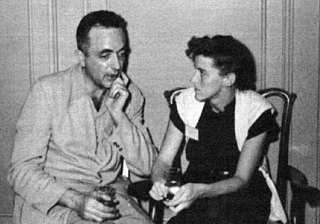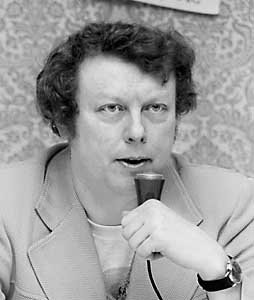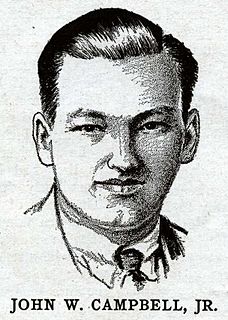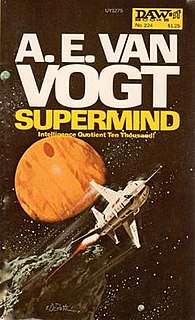Psi-Power Series
The first story they wrote in this so-called "Psi-Power" series was "That Sweet Little Old Lady," published in the Sept./October 1959 edition of Analog Science Fiction and Science Fact. Subsequent stories including "Out Like a Light" (Analog, April/May/June 1960), and "Occasion for Disaster" (Analog, November/December 1960 and January/February 1961). All of the stories were novella length and were subsequently reprinted in 1962 and 1963 by Pyramid Books under different titles ("That Sweet Little Old Lady" as Brain Twister, "Out Like a Light" as The Impossibles, and "Occasion for Disaster" as Supermind).
"That Sweet Little Old Lady" (Brain Twister) was nominated for the Hugo Award for Best Novel in 1960 but lost out to Starship Troopers by Robert A. Heinlein.
Laurence Janifer and Randall Garrett did not work together on any other stories after the completion of the Psi-Power series.

John Wood Campbell Jr. was an American science fiction writer and editor. He was editor of Astounding Science Fiction from late 1937 until his death and was part of the Golden Age of Science Fiction. Campbell wrote super-science space opera under his own name and stories under his primary pseudonym, Don A. Stuart. Campbell also used the pen names Karl Van Kampen and Arthur McCann. His novella Who Goes There? was adapted as the films The Thing from Another World (1951), The Thing (1982), and The Thing (2011).

Katherine Anne MacLean was an American science fiction author best known for her short fiction of the 1950s which examined the impact of technological advances on individuals and society.

Murray Leinster was a nom de plume of William Fitzgerald Jenkins, an American writer of science fiction. He wrote and published more than 1,500 short stories and articles, 14 movie scripts, and hundreds of radio scripts and television plays.

Laurence M. Janifer was an American science fiction author, with a career spanning over 50 years.

Gordon Rupert Dickson was a Canadian-American science fiction writer. He was inducted into the Science Fiction and Fantasy Hall of Fame in 2000.

Dallas McCord "Mack" Reynolds was an American science fiction writer. His pen names included Dallas Ross, Mark Mallory, Clark Collins, Dallas Rose, Guy McCord, Maxine Reynolds, Bob Belmont, and Todd Harding. His work focused on socioeconomic speculation, usually expressed in thought-provoking explorations of utopian societies from a radical, sometime satiric perspective. He was a popular author from the 1950s to the 1970s, especially with readers of science fiction and fantasy magazines.
Tom Godwin was an American science fiction author active throughout the 1950s into the 1970s. In his career, Godwin published three novels and around thirty short stories. He is best known for his short story, "The Cold Equations". Published in 1954, the short story was Godwin’s fourth work to be published and was one whose controversial dark ending helped redefine the genre.

Daniel Francis Galouye was an American science fiction writer. During the 1950s and 1960s, he contributed novelettes and short stories to various digest size science fiction magazines, sometimes writing under the pseudonym Louis G. Daniels.

Gordon Randall Phillip David Garrett was an American science fiction and fantasy author. He was a contributor to Astounding and other science fiction magazines of the 1950s and 1960s. He instructed Robert Silverberg in the techniques of selling large quantities of action-adventure science fiction, and collaborated with him on two novels about men from Earth disrupting a peaceful agrarian civilization on an alien planet.
Michael Joseph Kurland is an American author, best known for his works of science fiction and detective fiction. Kurland lives in San Luis Obispo, California.

James Henry Schmitz was an American science fiction writer born in Hamburg, Germany of American parents.
Theodore Lockard Thomas was an American chemical engineer and Patent attorney who wrote more than 50 science fiction short stories, published between the early 1950s to the late 1970s. He also collaborated on two novels with Kate Wilhelm, as well as producing stories under the pseudonyms of Leonard Lockhard and Cogswell Thomas, and was nominated for a Nebula award and a Hugo Award.

This is a bibliography of works by American writer John W. Campbell Jr.
"Despoilers of the Golden Empire" is a science fiction novelette by American writer Randall Garrett, originally published in Astounding Science Fiction in March 1959 under the pseudonym David Gordon.

Analog Science Fiction and Fact is an American science fiction magazine published under various titles since 1930. Originally titled Astounding Stories of Super-Science, the first issue was dated January 1930, published by William Clayton, and edited by Harry Bates. Clayton went bankrupt in 1933 and the magazine was sold to Street & Smith. The new editor was F. Orlin Tremaine, who soon made Astounding the leading magazine in the nascent pulp science fiction field, publishing well-regarded stories such as Jack Williamson's Legion of Space and John W. Campbell's "Twilight". At the end of 1937, Campbell took over editorial duties under Tremaine's supervision, and the following year Tremaine was let go, giving Campbell more independence. Over the next few years Campbell published many stories that became classics in the field, including Isaac Asimov's Foundation series, A. E. van Vogt's Slan, and several novels and stories by Robert A. Heinlein. The period beginning with Campbell's editorship is often referred to as the Golden Age of Science Fiction.
This is a list of works by the science fiction author Frank Herbert.
Pauline Whitby was British science fiction author who wrote under the pseudonym Pauline Ashwell (1928 - 23 November 2015. She has also written under the names Paul Ashwell and Paul Ash.

Supermind is a science fiction novel by A. E. van Vogt first published in complete form in 1977 by publisher DAW Books. It is a fix-up of "Asylum," a short story first published in Astounding Science Fiction in May 1942.

Space Mail is an anthology of science fiction short works edited by Isaac Asimov, Martin H. Greenberg, and Joseph Olander. It contains a series of short stories written in the form of letters, diary entries, or memoranda. The book is broken into three sections, each of which contains stories written in the type of documentation after which the section is named.

Analog: Writers' Choice is the fifth in a series of anthologies of science fiction stories drawn from Analog magazine and edited by then-current Analog editor Stanley Schmidt. It was first published in paperback by Davis Publications and hardcover by The Dial Press in 1983.













